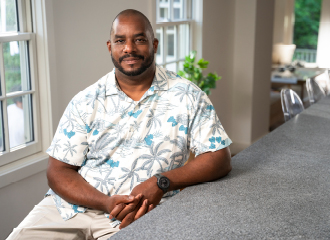“It’s OK To Talk About These Experiences”
3-minute read
“It’s OK To Talk About These Experiences”
3-minute read
Arafat looked out at the audience at the Veterans Day breakfast where he was a guest speaker. The Marine Corps Veteran recalls seeing his wife, then his mother and his sisters. “I look at the therapy and what I had gone through to get to that step—to where I’m talking about my own story,” he says, reflecting on his path to healing from PTSD. “I know that I wouldn’t have been able to do that if I hadn’t taken the steps.”
A tragic start to a deployment
Arafat’s journey to that Veterans Day stage began with his military service in the late 1990s and early 2000s. He was serving on a Navy ship. After 9/11, as Arafat and his crewmates were getting ready to deploy, they needed to step up training for special operations. “We were on the flight deck watching—I think it was the Marine Raiders,” he recalls. “They were doing their training operation, and we watched as the helo [helicopter] landed on the ship. But as it went to take off, the legging got caught around a netting, and the helo ended up backwards.” Submariners and sailors lost their lives.
Despite that traumatic event, Arafat and his crewmates had to move on and continue with their mission. Arafat served several more years after that event, leaving the Marine Corps in 2005.

Therapy Helps Marine Veteran Heal After Trauma
“This is just who I am now.”
When he ended his service, Arafat was dealing with PTSD but wasn’t aware of it. “I couldn't deal with fireworks anymore,” he says. He was also avoiding people and activities and was drinking heavily. “I think at one point, I was drinking maybe a liter of something a day,” he says. His relationships with his family and his ex deteriorated. He bought a motorcycle and was driving it recklessly. “I was doing a lot of things that I didn’t notice was related to PTSD,” he says.
Arafat pushed forward, just as he had on that Navy ship in 2001. “I just was like, OK, this is just who I am now,” he says. He completed a medical assistant program and then got a job at Massachusetts General Hospital. That was where he was first urged to seek help after an incident at work. “I had a co-worker who—me and her were very thick-headed, stubborn. She had spoken to me in a manner that I didn’t like, and I actually went off on her in the clinic.”
At this point, Arafat’s nurse manager intervened. Arafat says, “Peg grabbed me by my earlobe, put me in her office, and told me that I need to seek help and therapy because the short temper wasn’t going to work in the medical field.”
Family, therapy, and a new path forward
Arafat listened to his nurse manager and sought therapy from VA. He recalls one approach his therapist used. “One of the things she had me do is do a recording. So I would see her, go home, and relisten to the recording that we did,” he says. “And then she would have me replay something and talk about it—kind of relive it at my own pace to where I was more comfortable with it.”
Arafat credits therapy with helping him begin to heal from the trauma he had experienced. “Even though you never fully recover from what you experience, you can still take those steps forward to start the healing process.”
Also, where PTSD and its consequences had once damaged his relationships with family members, Arafat now sees his family—especially his wife and teenage son—as a primary source of support and motivation.
Reflecting on his mental health journey and experience in treatment, Arafat says, “Being a minority, we’ve always looked down on therapy. Therapy is not a bad thing, and it can be helpful. It's OK to seek help. It’s OK to let go. It’s OK to talk about these experiences.”
